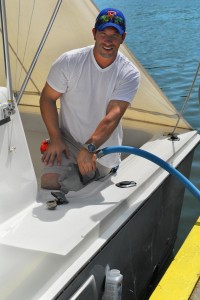Environmentally Safe Boating: Part Four
 Fueling your boat is obviously one of the riskiest practices when it comes to petroleum spills in the water. Not only will spilling gasoline harm the wildlife and ecosystem, the corrosive nature of the fuel can cause serious damage to the hull of your boat as well. Although gas stations built on piers are easily accessible for boaters, the ramifications of a spill are exponentially worse than if you were refueling on dry land. So whenever possible, throw your boat on the trailer and make the trip down the street to your standard station.
Fueling your boat is obviously one of the riskiest practices when it comes to petroleum spills in the water. Not only will spilling gasoline harm the wildlife and ecosystem, the corrosive nature of the fuel can cause serious damage to the hull of your boat as well. Although gas stations built on piers are easily accessible for boaters, the ramifications of a spill are exponentially worse than if you were refueling on dry land. So whenever possible, throw your boat on the trailer and make the trip down the street to your standard station.
Whenever you fill your boat, be sure to leave about 10 percent of the tank unfilled to allow for expansion and help prevent spills. There are multiple ways to determine when the tank is almost to capacity, including sounding sticks, listening to the filter pipe and, of course, taking note of the tank’s volume. Another one of the main ways boaters contaminate a body of water is by discharging outboard motor oil through the bilge pump; however, this should be an issue if you keep your engine well maintained. But just to be safe, it’s a good idea to place some oil absorbent materials in the bilge boom and underneath the engine.

